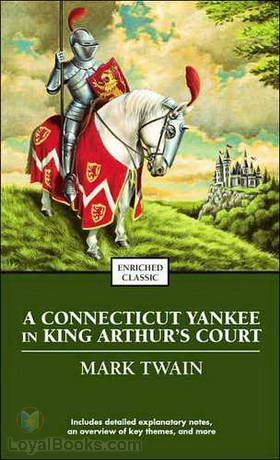
When Hank Morgan, a practical, no-nonsense Yankee who works in an ammunition factory as a head superintendent gets into a fight with an aggressive employee, little does he know what’s in store for him. The bully lays Morgan low with a skull-crushing blow delivered with a crowbar and knocks him out. When Morgan regains consciousness, he finds himself transported back in time, to the sixth century. From here on, the story describes the travails of a hard-boiled, true blue American with strong democratic values who has to deal with medieval feudalism and ancient customs!
A Connecticut Yankee in King Arthur’s Court was published in 1889. Mark Twain wrote it after the great success of his early novels, Tom Sawyer and Huckleberry Finn. His first book, Innocents Abroad had met with a lukewarm reception. Connecticut Yankee… met with mixed reactions. Some regarded it as a great piece of historical fiction. In Britain, it was seen as an attack on their history and culture.
Laced with Twain’s inimitable brand of irreverent humor, the book portrays the sheer absurdity of romanticizing the past. If people in modern times thought Camelot and the legends of the Knights was the perfect world to live in, Twain wanted to show them otherwise. He also sought to strike a balance between the mindless worship of technology and so called “progress.” Hank Morgan also tries to modernize the past! He tries to educate the medieval people about machines, science and tries to dispel their superstitious beliefs in magic.
Many of the famous Knights of the Round Table feature in this book. Other characters like Morgan Le Fay, Merlin, King Arthur and Queen Guinevere also appear, in tandem with many of Twain’s own creations. Mark Twain’s own disillusionment with industrialization and his exploration of the concept of time travel are described in the book. It was in this sense one of the earliest examples of this genre of science fiction.
A Connecticut Yankee in King Arthur’s court has been extensively adapted to stage, radio, screen and television. Since the first silent version in 1921, the book has found favor with Hollywood and a variety of stars have played roles in the films. Disney adaptations, various spoofs and spinoffs, animated versions and references in other books have ensured that the book’s popularity never wanes.
For Mark Twain enthusiasts and readers who love humor blended with some historical fiction, this is indeed a great addition to their collection!

Other Audiobook
Audiobook: Bannertail: The Story of a Graysquirrel
A baby squirrel is adopted by a farm cat after his mother is killed, but
Audiobook: Lost House
Austin Ford, the London correspondent of the New York Republic, is spending some idle time
Audiobook: Autobiography of St. Ignatius
This account of the life of St. Ignatius, dictated by himself to Father Gonzalez, is
Audiobook: Sammlung kurzer deutscher Prosa 021
Diese Sammlung umfasst 15 deutschsprachige Prosa-Texte verschiedener Genres. “Die Schrecken der deutschen Sprache” übersetzt von
Audiobook: Angel Food Time: Little Talks to Little Folks
This is the sixth and final volume of the “Angel Food” Series by Father Brennan.
Audiobook: Chronicles of crime and criminals No.1
Published by Beaver Publishing Company, Toronto, and subtitled “Full and authentic account of the murder
Audiobook: Birds and All Nature, Vol. V, No 5, May 1899
“Birds and All Nature” was a monthly publication of the Nature Study Publishing Company of
Audiobook: Rangeland Avenger
If you enjoy a fast moving western dealing with vengeance and well-deserved payback, you’ll like
Audiobook: Logic of Hegel
This is the William Wallace translation of the first part of Hegel’s Encyclopedia of the
Audiobook: Romance of Modern Astronomy
From the series, The Library of Romance, the reader is introduced in this book to
Audiobook: Household Tales (Version 2)
Do you like fairy tales and stories about all sorts of animals and people? Here
Audiobook: Lances of Lynwood
The Lances of Lynwood brings to life the high days of knighthood and chivalry in